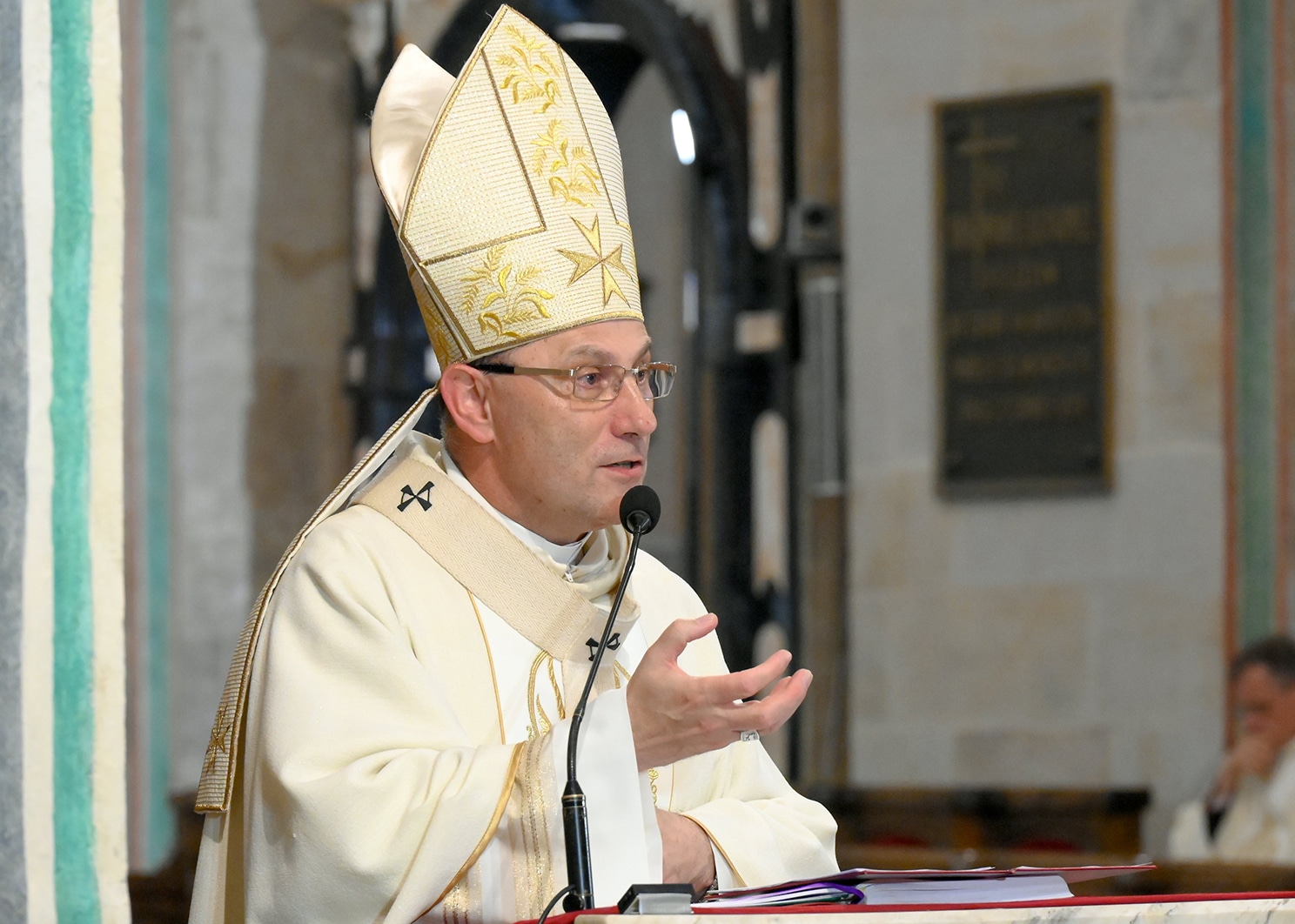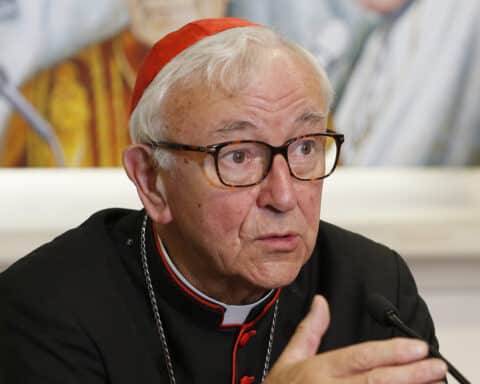GNIEZNO, Poland (OSV News) — The Catholic Church needs to form priests who are empathetic and are “ready to face” the issue of abuse, said Archbishop Wojciech Polak of Gniezno, the current primate of Poland.
It concerns the whole Church and “without a doubt” every diocese in Poland, he stated, warning that any denial of abuse is “satanic.”
Archbishop Polak made the comments in a wide-ranging interview with OSV News ahead of Holy Thursday.
He is the primary bishop responsible for the establishment of the commission to investigate cases of abuse in the church in Poland that has been in the preparatory phase for a year now.
Primates historically held a title of “interrex” in Poland — they would take over power in the kingdom during the interregnum, between elections for a new monarch. Today, the role is more symbolic, but Archbishop Polak is seen as one of the most outspoken leaders of the church in Poland. Many Catholics hoped he also would become president of the Polish bishops’ conference.
On March 14 Archbishop Tadeusz Wojda of Gdansk was elected to the post, and Archbishop Polak was chosen by the bishops for a second term as their conference’s delegate of child protection — a post, victims say, he has handled “with determination over the years to clean up after the abuse crisis.”
Asked about the recent bishops’ elections in a March 25 interview with OSV News, Archbishop Polak said that “the basic shape of the direction in which the bishops’ conference would go or not — is not decided by the (so-called) presidium (president, his deputy and secretary).”
“It’s decided by the permanent council, and that’s the body decisive for the future of the church in Poland,” Archbishop Polak said, expressing the hope much needed reforms will proceed during the current term. The Polish bishops’ conference will witness a generational shift as Archbishop Stanislaw Gadecki of Poznan, former conference president, his deputy, Archbishop Marek Jedraszewski of Kraków, and Cardinal Kazimierz Nycz of Warsaw retire in 2024.
Abuse affects the whole Church
Primates of Poland lead the archdiocese that is the birthplace of the Polish state, Gniezno, under a 600-year-old papal decree. Gniezno also is where St. Adalbert of Prague is buried. Known in Poland for his birth name Wojciech, he was martyred in his efforts to convert the Baltic Prussians to Christianity.
The primates symbolically “guard the seat of St. Wojciech,” a role especially important during times of turmoil, such as communist-era rule of Blessed Cardinal Stefan Wyszynski, dubbed “The Primate of the Millennium.”
For five years — since the abuse crisis broke out in full force in Poland in 2019, with the airing of the documentary “Tell No One” — Archbishop Polak has been delegate of child protection of the Polish bishops’ conference.
“It was five years of crisis, yes,” he told OSV News. “And the answer we must keep finding to tackle the crisis is always rooted in a will to really face the crisis that is still ongoing.”
“It’s not only about seeking the truth, but also — maybe above all — about taking care of those that were hurt, and that’s no easy task because those people are still hurting,” Archbishop Polak said.
“The fact that this crisis is about the entire church is not questioned by anyone anymore, and the fact that it concerns every diocese in Poland is also stated without any doubt,” he said. And that, he underscored, “is an important change we see after those five years. No bishop and no religious superior would say today that abuse is not a reality he or she has to face.”
A tectonic shift in policy
The church in Poland has experienced a tectonic shift regarding abuse policies over the last decade. The office of child protection of the Polish bishops’ conference and St. Joseph Foundation were created in 2019. The latter is one of a few in the world to help victims of abuse by funds contributed by priests, both diocesan and from religious orders, and from bishops of all the country’s dioceses.
The Kraków-based Center for Child Protection celebrates its 10th anniversary in 2024.
“There is change. But we’re still in the middle of the road,” the primate said, pointing to a mentality of denial as the obstacle to faster reforms.
A crucial element still missing for Poland is an in-depth report on the numbers of past cases and pattern of clerical sexual abuse in the country. On March 14, 2023, the bishops announced they would start a process to establish a commission to study the Polish church’s crisis in this regard.
In creating it, “we asked ourselves first, what cases the commission should analyze and which methodology it should embrace,” the primate said, referring to various European reports — all of which had different models and leadership.
“Our first reflection was that it can’t be a commission only for archival, old cases,” he said, although those are the most complicated in Poland.
A history of sexual blackmail
The communist regime that ruled the country after World War II and until 1989 often used the “sexual abuse” card to blackmail priests leading an “immoral life,” or accuse someone innocent of wrongdoing just to smear the person’s name. “Here the past requires a very specific context that France, for instance, didn’t have,” the primate said.
“But the bishops’ conference decided already that we are not going to stop with historical cases. We are going to study the current reality. How did we react, how do we react today, strengthened by the new Vatican documents,” Archbishop Polak said.
In France, a new report released in October 2021 estimated that 330,000 children were sexually abused in France over the past 70 years. According to AP, the figure included abuses committed by some 3,000 priests and an unknown number of other people involved in the church. The report said church officials had covered up abuse in a “systemic manner” for decades.
Archbishop Polak said that In Poland, “what is still under question is how we will approach the harm caused to people whom the papal document ‘Vos Estis Lux Mundi‘ calls ‘vulnerable adults.’ In the past our action was focused on addressing the abuse of children, and today we have a whole new category.”
It also is necessary to look at the commission as an entity “for the whole reality of the church,” — on a diocesan level but also that of religious orders — “both male and female,” the primate said.
The work of a task force team discerning the shape of the future commission is to conclude “soon,” the primate said. Asked whether we’ll see the commission start working in 2024, he said “I hope for it,” adding that it is still to be decided which model of leadership the commission would adopt.
“Whether it’s the leader who decides on his team or certain branches of the church suggesting members, one thing is for certain — the commission is going to be independent, but rooted in the reality of the church,” Archbishop Polak said.
“I can’t imagine not having a canon lawyer on the commission, along with a historian, archivist, psychologist or state law expert,” as their absence may lead to certain mistakes, the primate said, referring to different models of commissions in Europe “of which some had certain confusions precisely due to a discord between the bishops and the commission, and such was the case of France.”
“The works (of the task force) are very intense, but leaning towards the end of the preparatory phase, that I can say for sure,” he stressed.
Priests must not deny the truth
Asked ahead of Holy Thursday, what kind of priests the church needs today, the primate said she “needs priests for whom the protection of children, adolescents and the vulnerable as well as helping those harmed by sexual abuse is a pastoral priority.”
“The church needs priests who will not deny the truth about the abuse of minors and priests who will also not be horrified by this fact, but will clearly undertake action against the criminal offense and criminal act that abuse is.”
It’s the priests, the primate said, who are reporting the majority of cases today to law enforcement institutions, therefore the Church needs “awareness among priests, so that they do not remain silent, so that they report, so that they want this purification that is taking place.”
The Church also needs “empathetic priests,” he emphasized. “It is the question of the relationship with those harmed by sexual abuse … because as we know this trauma and this wound is not a simple and easy reality also to understand and accept, it is often experienced differently by those in trauma … so we need to form priests that are ready to face it.”
As many influential priests in Poland voice their concerns that the sex abuse scandal is only a means to attack the Church, the primate said for him it’s clear: “It’s wrong, in some ways satanic, to deny the problem itself or, under the influence of fear, to simply close ourselves off to the problem. … It’s false solidarity, or what Pope Francis calls clerical ‘corporate solidarity.'”
Returning to the Gospel
“The abuse crisis is not a matter of faith,” the primate added. “It’s a matter of crime and we cannot hide behind the matters of faith in this regard.”
“It is a crime that is actually multiplied, because it not only touches someone’s body, but a soul. It touches the intimate sphere of our relationship with God,” he said, and the Church needs to especially take care of those that were abused, but still are members of the Church.
He emphasized, however, that given the great amount of experience the Church has with regard to tackling the abuse crisis, it can serve Polish society in starting a wider debate about sexual abuse.
“By proceeding with excellent standards in the church, we can serve the society that still seems very resistant to talk about abuse in a broader sense. Yes, the church needs to clean up. But it can also shape and help the broader society,” the primate said.
“We need a national effort to build prevention and sensitivity to the topic,” he said.
Asked what is the remedy for regaining trust in the Church, the primate said, “First of all, if I would see any way to regain trust, it is certainly through the church that returns to the Gospel, (it is) when the church returns to living the Gospel, to the reality in the church that is based on the truth of Christ.”
“Secondly,” the primate said, “regaining confidence in the church will be through concrete people, through their maturity, through their conversion.”





